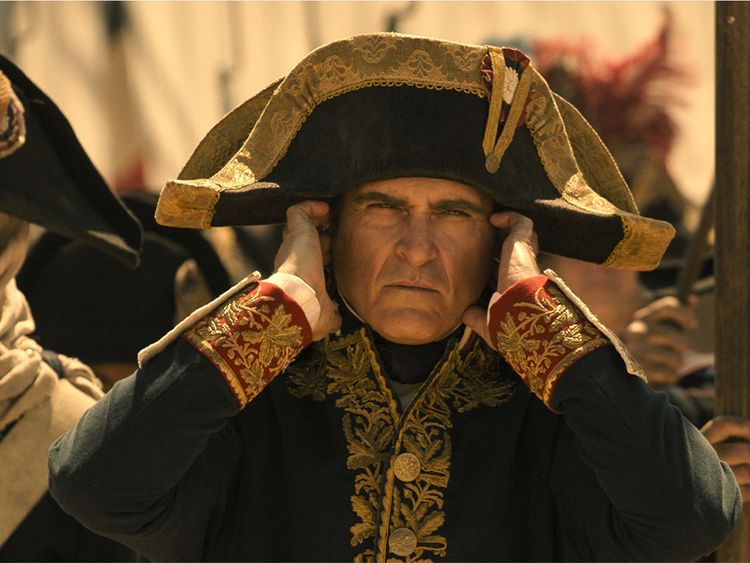How can someone capture the life and times of Napoleon Bonaparte and condense it into a mainstream Hollywood blockbuster?
When you’re Ridley Scott, the answer is to strip out all the superfluous parts and give the people what they paid for.
The latest film from the English master sees the infamous French emperor go under the microscope as we examine how he came to power, the battles he won, and the people he lost along the way.
Joaquin Phoenix is impeccable in the leading role, and gives one of his best performances yet as the volatile and mercurial Corsican man.
Phoenix’s performance offers an insight into why Napoleon is one of the most influential people in modern history; we see both sides of the coin.
The secret to Scott’s film is focusing more on Napoleon the man first, and Napoleon the military mastermind the second.
If this film is to be believed, one informs the other.
Ridley Scott has made no secret of the fact he doesn’t make historical films with the aim of being 100% realistic, and frankly, the film is all the better for it.
Instead of seeing Phoenix attempt a Peter Sellers-style comedic French accent, he is given free rein to act in his natural accent and voice and dig deep into the mannerisms and characteristics of the man he is portraying.
Everyone has a fixed notion of what Napoleon acted and looked like in their heads, and Phoenix will in time become what people see when they think of Napoleon like how they see Daniel Day-Lewis when they think of Abraham Lincoln.
Vanessa Kirby is very much Phoenix’s equal, in terms of billing, prominence in the story, and performance.
It is no secret that Vanessa Kirby is one of the great actors to emerge over the last 10 years, and seeing her effortlessly go toe-to-toe with Joaquin Phoenix in their scenes together is exhilarating.
The story of Josephine is intertwined with the story of Napoleon, and the smartest decision the film makes is making it just as much about her as the titular character.
Even when Napoleon is wandering the sands of Egypt or navigating brutal Russian winter, his mind is always with Josephine, and Kirby brings her to life effortlessly.
It is a rare treat to see two terrific actors share the screen together, and that alone makes Napoleon worth the price of admission.
With that said, Ridley Scott hasn’t forgotten his action roots, and indeed this film possesses what may well be the best set-piece the legendary director has ever done.
This film is what the IMAX format was designed for, and needs to be seen on the biggest screen possible.
The rattling sound effects, sweeping landscape shots and exciting battle scenes can only be done justice on your local cinema screen, and Scott milks every last cent out of his budget.
Napoleon’s budget is reportedly just below the €200 million Euro mark, and you would fully believe it.
It is incredibly satisfying when a big film like this remembers it is a big film and not merely meant to be consumed as background noise on your smartphone while making morning coffee.
Every shot or set-piece looks and feels lived-in and expensive, with some incredible costume design, massive battlefield scenes with a cast of hundreds and beautiful palace scenes where even looking at it makes you feel poor.
If there is a comparison for Napoleon, it would be Stanley Kubrick’s masterpiece Barry Lyndon.
Both films have a fantastic lead performance, really push the boundaries of what can be done in-camera and are both terrifically funny.
The biggest surprise with this film is the comedic streak that runs through it, and it is a testament to Phoenix that he can be a tyrant in one scene and a whimpering buffoon in the next.
The choice to relegate the invasion of Russia to a 10-minute segment may irk some (that segment alone could have been stretched out into a 3-hour film) but the film makes it up to us with a bitterly funny tone.
In this massive, expensive film full of epic battle scenes, the best scene is Joaquin Phoenix falling down a flight of stairs while he launches a palace coup.
The frantic look on Phoenix’s face as he looks to his brother for military guidance and help with the coup is priceless.
The 2017 film Phantom Thread also comes to mind when watching this film, with the toxic relationship between Napoleon and Josephine a mirror of what happens in Paul Thomas Anderson’s masterpiece.
Napoleon makes it clear that the titular character is a repulsive, nasty and vindicative little man and the only way he feels any way alive is when he sends thousands of men to their deaths in the name of restoring a past glory he barely understood to begin with.
The more things change, the more they stay the same.
Overall, there is an awful lot to digest and process with Napoleon, with the film spanning decades and character dynamics changing at the drop of a hat.
Similar to Oppenheimer, this film will inspire people to look up the Wikipedia page for the people involved in the real-life events, and the film does go out of the way to tell you who certain people were, what their title was, and when the events you are seeing took place.
Napoleon is a hair away from competing with Nolan’s epic or the recent Scorsese film Killers Of The Flower Moon, but the film will have a very long and healthy half-life.
Regardless if you have college-level knowledge of the man or just know the fact he was name-dropped by ABBA, the film works for everyone in the audience.
At the age of 85, Ridley Scott is still releasing challenging, daring and exciting blockbuster films.
It is about time people start talking about him in the same revered tones we discuss great English filmmakers like David Lean or Powell and Pressburger.
